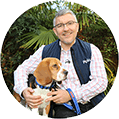Chewing is the most natural behaviour in the world for dogs, but sometimes it can get out of hand! With the help of Petplan behaviourist Nick Jones, we look at why dogs chew and what you can do to encourage a persistent gnawer to change their ways.
You know the scenario: shredded papers, a mauled slipper, a mangled pair of glasses… Exploring the world by nibbling it comes naturally to puppies, and dog chewing often continues into adulthood. Read on to learn about normal chewing behaviour in dogs, when it’s a problem, and how to get them into better habits.
Chewing in puppies
There are two peak periods in a puppy’s development when they’re prone to chew. The first is at three to six months of age when their pinprick-sharp first teeth make way, in the space of just two months, for their adult teeth – most grown dogs have 42 of these. It’s no wonder your pup is feeling fractious at this stage. Chewing furiously helps relieve the painful activity going on in their mouth as the new teeth bed in.
The next period, between six and 12 months old, is called the ‘exploratory’ phase and can last up to six months. This is when your dog socialises, discovers its world, and tests out what’s edible or not – as well as exploring the boundaries of what they can get away with!
Why do adult dogs chew?
As an adult, your dog will continue to chew. It’s both a natural instinct and a way to keep their gums and teeth healthy, so let your pet do it.
But what if your dog is persistently destroying items – your handbag, the carpet, the remote control? Or risking their health by chewing on their paws, wood that could splinter, batteries, or other things that could land them at the vet’s? Dogs do many things that baffle us, and if any of this sounds familiar, there may be a psychological or physical dimension to their chewing. These strategies could help:
Introduce age-appropriate dog chewing toys
Get them into good chewing habits early on by occupying your puppy with teething bones, balls and rings suitable for their more delicate junior teeth. Some can be stuffed with a little of their daily food allowance or smeared with peanut butter. As they work to root out the treat, chewing their toy becomes associated with a rewarding activity.
Praise your pooch
Shouting at your dog for chewing the wrong things, especially after the event, will only confuse them and make them anxious. Instead, encourage good dog chewing behaviour by diverting their attention away from banned items and positively towards their own ‘designated’ chew items. If you walk into a room and your dog is playing with a chew toy, that’s a perfect moment to give some effusive praise.
Vary the choice of chewables
Keep your dog entertained with a good selection of things to chew. Have enough to be able to alternate them regularly, and avoid him getting bored. There’s a huge range out there: hollow rubber activity balls with dimpled, interesting shapes and extra fabric or noise elements; or fringed and woven rope chews, which double as fetch and tug fun.
Tasty chews include dental sticks and jerky-like snacks in an array of flavours (including plant-based, animal hide and even faux antlers). All will give your dog a satisfying toothy workout and support their oral hygiene. Dogs often want quiet time to chew, so leave them to it rather than interrupt them to play.
Don’t leave them alone for too long
Dogs can experience separation anxiety if left alone. Video footage has shown them fretfully wandering from room to room searching for their ‘pack’ (in this case, you). In their distress, they may well look for something to comfort them – such as a good gnaw on your floor rug, flip flops or the contents of the laundry basket.
Can you take your dog out with you? Can someone pop by to take them for a walk? Is doggy day-care an option? If not, make sure they have some favourite toys close by, leave the radio on for company, don’t leave them too long, and don’t confine them (another trigger for anxiety chewing).
Give them meaningful attention
Dogs need interaction to feel mentally engaged, or destructive behaviour may follow. When you shout at them because they’ve chewed something off limits, they’ve got your attention, albeit negatively – to them, it’s better than being ignored. Give your dog a few minutes a few times a day of focused, joyous playtime to keep them topped up on that score.
Get them out of the house
Walks are essential for the physical and mental wellbeing of a dog, filling them with feel-good endorphins and using up their boundless energy. Their nirvana is discovering new smells and sights, so vary your routes here and there.
A contented dog shouldn’t chew excessively, and a good mix of activities will help to keep them satisfied, stimulated and relaxed. But if you’re worried about dog chewing, talk to your vet or consider consulting a behaviourist to get to the bottom of the problem.
